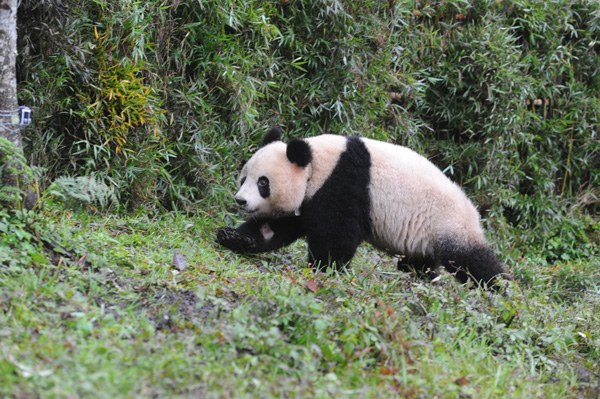

Giant panda Xue Xue is released into the wild at the Liziping Nature Reserve in Shimian in Southwest China's Sichuan province on Oct 14. After two years' training in habitat selection, foraging, and avoidance of natural enemies, it's believed the 2-year-old female will be able to survive in the natural habitat. Xue Xue was the fourth panda to be released, following Xiang Xiang, Tao Tao and Zhang Xiang. XUE YUBIN/XINHUA
Changes to China's forestry management laws are helping to safeguard one of the world's best-loved animals.
In the past three years, Chen Xiaohong, a farmer in the mountainous province of Sichuan, has renovated his home and his family's income has doubled as a result of a new conservation model in Laohegou, a former State-owned farm with an adjoining forest.
In 2012, the Sichuan Nature Conservation Foundation and the government of Pingwu county signed a conservation agreement to lease 110 square kilometers of forest in and around Laohegou for 50 years, enabling the foundation to establish a new panda reserve.
"Just three years after the agreement was signed, my life has changed dramatically," Chen said, adding that the foundation has helped him sell farm produce such as honey and chicken in urban areas.
The 43-year-old farmer said that while the local farmers are prospering, the lives of animals such as pandas are improving. He compared the situation to that last seen in the 1980s, when the animals were seen more frequently.
Laohegou connects a number of nature reserves that provide an important migration path for pandas.
Jin Tong, a conservation scientist with The Nature Conservancy who also visits the Laohegou project, said: "We had been looking to introduce the land trust model to China to protect wild animals for a long time, but it wasn't possible until the forestry tenure reforms six years ago."
In 2008, the State Council, China's Cabinet, decided to promote the Collective Forest Tenure Reform, which allows 1.82 million sq km of woodland under collective ownership nationwide to be rented for commercial use.
Jin said the reform has enabled NGOs and individuals to establish private protected areas that protect the environment and biodiversity.
However, despite the opportunities for new conservation initiatives provided by the reform, a recent study showed that its implementation could also threaten the pandas' habitat. The study conducted by a team of researchers from Beijing Normal University showed that the reform would allow more than 15 percent of the pandas' habitat to be transferred to private investors for commercial use.
Zhang Li, a professor at the university who specializes in the protection of wild animals who led the study, said that without proper control measures the worst-case scenario is that reduction of the habitat could result in the country's panda population, currently numbering about 1,600, declining by about 15 percent.
Zhang said the reform has not yet fully been implemented in provinces with giant pandas, including Gansu and Sichuan, but it soon could be.
Sichuan in search for Europe‘s biggest panda lovers
2014-11-20Injured panda recovering under care
2014-11-18China to release more pandas to wild
2014-09-21Copyright ©1999-2018
Chinanews.com. All rights reserved.
Reproduction in whole or in part without permission is prohibited.